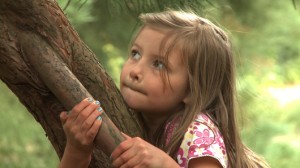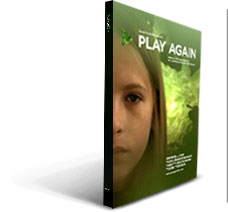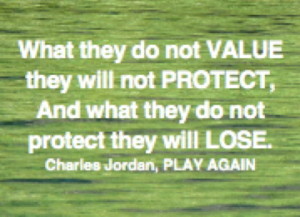Film Synopsis (Cine Sinopsis)
One generation from now most people in the U.S. will have spent more time in the virtual world than in nature. New media technologies have improved our lives in countless ways. Information now appears with a click. Overseas friends are part of our daily lives. And even grandma loves Wii.
But what are we missing when we are behind screens? And how will this impact our children, our society, and eventually, our planet? At a time when children play more behind screens than outside, PLAY AGAIN explores the changing balance between the virtual and natural worlds. Is our connection to nature disappearing down the digital rabbit hole?
This moving and humorous documentary follows six teenagers who, like the “average American child,” spend five to fifteen hours a day behind screens. PLAY AGAIN unplugs these teens and takes them on their first wilderness adventure – no electricity, no cell phone coverage, no virtual reality.
Through the voices of children and leading experts including journalist Richard Louv, sociologist Juliet Schor, environmental writer Bill McKibben, educators Diane Levin and Nancy Carlsson-Paige, neuroscientist Gary Small, parks advocate Charles Jordan, and geneticist David Suzuki, PLAY AGAIN investigates the consequences of a childhood removed from nature and encourages action for a sustainable future.
Where we are coming from
Seventy years ago, the first televisions became commercially available. The first desktop computers went on sale 30 years ago, and the first cell phones a mere 15 years ago. During their relatively short tenure these three technologies have changed the way we live. Some of these changes are good. Television can now rapidly disseminate vital information. Computers turned that flow of information into a two-way street. Cell phones enable unprecedented connectivity with our fellow human beings. And the merging of cell phones and the internet has even allowed protest movements around the world to organize and thrive.
But there’s also a down side. For many people, especially children, screens have become the de facto medium by which the greater world is experienced. A virtual world of digitally transmitted pictures, voices, and scenarios has become more real to this generation than the world of sun, water, air, and living organisms, including fellow humans.
The average American child now spends over eight hours in front of a screen each day. She emails, texts, and updates her status incessantly. He can name hundreds of corporate logos, but less than ten native plants. She aspires to have hundreds of online friends, most she may never meet in person. He masters complicated situations presented in game after game, but often avoids simple person-to-person conversation. They are almost entirely out of contact with the world that, over millions of years of evolution, shaped human beings — the natural world.
The long-term consequences of this experiment on human development remain to be seen, but the stakes couldn’t be higher. By most accounts, this generation will face multiple crises — environmental, economic and social. Will this screen world — and its bevy of virtual experiences — have adequately prepared these “digital natives” to address the problems they’ll face, problems on whose resolution their own survival may depend?
As we stand at a turning point in our relationship with earth, we find ourselves immersed in the gray area between the natural and virtual worlds. From a global perspective of wonder and hope, PLAY AGAIN examines this unique point in history.
Cine Sinopsis en Espanol
PLAY AGAIN es un documental respecto a las consecuencias que se generan cuando lo niños y niñas pasan mucho tiempo en frente de los mundos virtuales disponibles más que en los espacios naturales.
PLAY AGAIN es un documental dirigido por Tonje Hessen Schei, producido por Meg Merrill y productor ejecutivo, Lowan Stewart; ganador de más de siete premios en Estados Unidos y Europa como Mejor Documental, Mejor Película de Educación y Mejor Documental otorgado por el Público.
Esta película narra como para muchos personas, especialmente los niños, las pantallas y el mundo virtual es el medio por el cual experimentan y perciben el mundo, que es en forma digital, con imágenes, voces y escenarios que se han vuelto cada vez más reales que el sol, el agua, el aire y los organismos vivos, incluidos los seres humanos.
Entonces, ¿qué pasará con la supervivencia de las futuras generaciones ante un mundo real, en caso de perderlo todo? En un momento en que los niños juegan más detrás de una pantalla, PLAY AGAIN anima a los individuos, familias, escuelas y comunidades a examinar sus relaciones con la tecnología y la naturaleza, inspirándolos a tomar medidas para volver a conectar a los niños con el mundo natural.
PLAY AGAIN, es un conmovedor documental que sigue a seis adolescentes que pasan de cinco a quince horas al día detrás de las pantallas y los llevan en su primera aventura con la naturaleza – un lugar donde no hay electricidad, no hay celular, no hay realidad virtual, desconectándolos y desenchufándolos completamente.
A través de las vivencias de los niños y el análisis de expertos, entre ellos educadores, neurocientíficos, genetistas, ambientalistas y sociólogos PLAY AGAIN investiga las consecuencias de una infancia alejada de la naturaleza, estimulando la acción en los niños para un futuro sostenible.
Comentarios acerca de la película:
“Esta película ilustra poderosamente lo que sucede cuando los niños ya no conviven a la naturaleza. Es sorprendente…”
-Su Alteza Real la Princesa Irene van Lippe-Biesterfeld (Netherlands)
“Creo que este es uno de los grandes desafíos que enfrentamos hoy. Las consecuencias de nuestro distanciamiento con la naturaleza será devastadora para nosotros como individuos y para la sociedad. Este documental tiene un gran impacto, muy buen trabajo…” -David Suzuki, el mundialmente famoso locutor canadiense de la ciencia
“¡Todo el mundo debería ver esta película!”
-Richard Louv, autor del libro Last Child in the Woods
“Lo que no se valora, no se protege. Y lo que no protege, se pierde.”
-Charles Jordan, PLAY AGAIN




